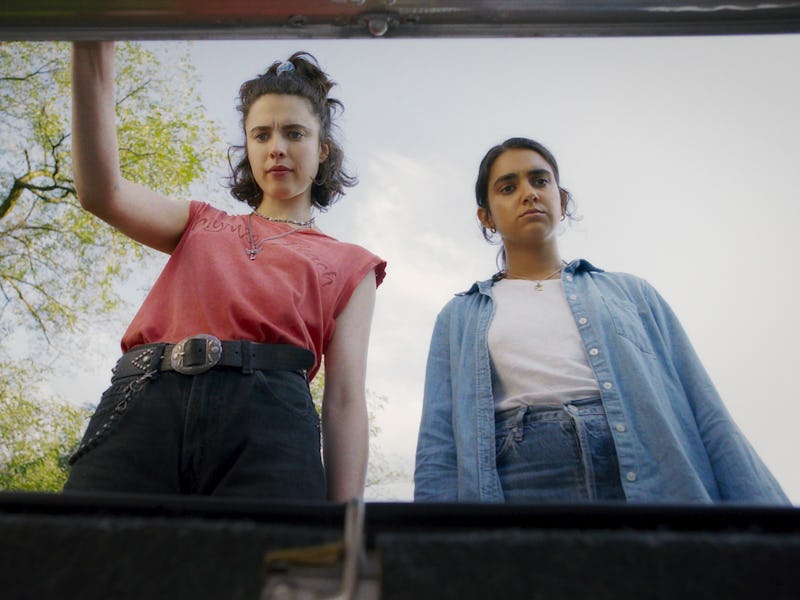Drive-Away Dolls Is Coen Absurdity at Its Most Ridiculous
In his first solo directorial stint, Ethan Coen shows which brother was the silly one.

Drive-Away Dolls is best thought of as a time capsule. Apart from being set in the ’90s, the raucous lesbian road trip movie is a snapshot of the Coen Brothers’ early career and, perhaps most tellingly, a glimpse at a Coen movie that quite literally might’ve been.
Director Ethan Coen and his wife, Tricia Cooke, first dreamed up the movie in the early 2000s, imagining it as a riff on the 1970s exploitation romances Coen saw in his youth. By 2007, it had had a director and cast attached — imagine Selma Blair, Holly Hunter, Christina Applegate, and Chloë Sevigny making a meal out of this — but dropped back into development hell. Almost 20 years after it was conceived, was Drive-Away Dolls worth the wait? Kind of.
Qualley is hysterically over the top as the free-spirited friend to Viswanathan’s buttoned-up straight man.
Since the Coen Brothers split up to pursue solo careers, they’ve offered a fascinating insight into what each brother brought to their films. Joel Coen’s crushingly bleak The Tragedy of Macbeth showed he might have been responsible for their dark, melancholic late-career work and for the undercurrent of sadness in their earlier films. With Drive-Away Dolls, Ethan Coen reveals that the absurd thread of comedy running throughout their films was just a tiny dip into the depths of his capacity for silliness.
Formerly titled Drive-Away Dykes (which should tell you all you need to know about the movie’s tongue-in-cheek tone), Drive-Away Dolls follows two queer best friends, the free-spirited Jamie (Margaret Qualley) and the prudish Marian (Geraldine Viswanathan), who embark on an impromptu road trip to Tallahassee. But the car they rent turns out to have unexpected cargo in the form of a decapitated head (an over-the-top, underused Pedro Pascal) and a mysterious box full of priceless objects.
Dodging angry ex-girlfriends (a hilariously sharp Beanie Feldstein), and on the run from dangerous henchmen Chief (Colman Domingo, sinister and somber) and Arliss (Joey Slotnick, playing a cartoon-character version of a Coen character), Marian and Jamie must figure out what to do with their valuable cargo — after they sex their way through the American South, of course.
The funniest scene of Drive-Away Dolls features Beanie Feldstein and a wall dildo.
Ethan Coen’s first solo film taps into the Looney-Tunes-inspired absurdity of early Coen Brothers movies like Raising Arizona, but without the grounding influence of Joel Coen to keep him from going completely off the rails. That’s not to say it’s unenjoyable to see Ethan Coen’s goofiness be completely unleashed in all its unhinged, queer-celebrating glory. Every character spouts mile-a-minute dialogue, each scene moves with the speed of someone on speed, and every sex scene finds new ways to out-raunch the last.
The absurd tone even trickles down to the technical level. Every scene moves to the next with a newly ridiculous wipe transition, complete with a crash sound effect. By the time the 500th scene transition has ended with a wipe that shows the next scene literally crashing into it as you hear the sound of glass shattering, you have to laugh. And by the time a new surreal, LSD-trip-style scene showing Miley Cyrus beckoning to the audience appears for the third time, you just have to accept that this is all the film is.
With Drive-Away Dolls, Ethan Coen shows what might be the purest, most basic form of the absurd Coen Brothers comedy. At some points, the tone gets so outrageous that it starts to feel like a parody of an early Coen Brothers movie, and the edge that Joel Coen clearly brought to their collaborations is a notable absence. But it’s hard to dislike a movie as silly (and aware of its own silliness) as Drive-Away Dolls. That it’s an unapologetically queer movie also helps, as it pulls from the bold colors and outsize performances of queer cinema and camp.
Pedro Pascal is sadly underused.
Drive-Away Dolls is like if the New York Post’s infamous headline “Headless Body Found in Topless Bar” was a movie (or, more accurately, a better movie than the one already using this colorful title). It has its tongue firmly in its cheek, among other places, and is happy cruising along as an inside joke that somehow became a very silly, very horny film.